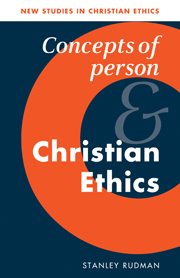Book contents
- Frontmatter
- Contents
- General editor's preface
- Acknowledgements
- List of abbreviations
- Introduction
- PART I ‘PERSON’ IN CONTEMPORARY ETHICS
- PART 2 ‘PERSON’ IN CHRISTIAN PERSPECTIVE
- PART 3 IMPLICATIONS FOR A CHRISTIAN ETHIC
- 11 A communicative ethic: Hauerwas and Habermas
- 12 A community of ethical difference: including the ‘other’
- 13 The logic of superabundance: an ethic of forgiving love
- 14 Rights and persons: the religious ground of human rights
- 15 The integrity and transformation of creation
- Conclusion
- Notes
- Select bibliography
- Index of subjects
- Index of names
12 - A community of ethical difference: including the ‘other’
Published online by Cambridge University Press: 02 December 2009
- Frontmatter
- Contents
- General editor's preface
- Acknowledgements
- List of abbreviations
- Introduction
- PART I ‘PERSON’ IN CONTEMPORARY ETHICS
- PART 2 ‘PERSON’ IN CHRISTIAN PERSPECTIVE
- PART 3 IMPLICATIONS FOR A CHRISTIAN ETHIC
- 11 A communicative ethic: Hauerwas and Habermas
- 12 A community of ethical difference: including the ‘other’
- 13 The logic of superabundance: an ethic of forgiving love
- 14 Rights and persons: the religious ground of human rights
- 15 The integrity and transformation of creation
- Conclusion
- Notes
- Select bibliography
- Index of subjects
- Index of names
Summary
In the last chapter we outlined elements of a communicative ethic based on two very different sources: Hauerwas' narrative ethic and Benhabib's development of Habermas' discourse ethic. Although not intended as a religious ethic, Benhabib's attempt to develop a ‘dialogically reformulated universalist ethical theory’ contains structural possibilities for a dialogical Christian ethic that is potentially universal in scope, combining narrative and rational argument, and yet true to its own historical particularity. Her corrections to the understanding and place of rationality and gender could be welcomed by Christians who are looking for fresh approaches that will enable the whole Christian community to respond positively to more egalitarian patterns of Christian community life in the organisation of the church. Furthermore, she is not unsympathetic to a utopian element in her ethic, which might prove amenable to an eschatological adaptation. As we shall see shortly, the ethical outlook of the primitive church was strongly influenced by eschatological thinking. Above all, her emphasis on the ‘concrete other’ represents a move that should commend itself to Christian ethicists who are dissatisfied with combinations of teleological and deontological ethical theories, yet wish to adopt a more universalistic stance than Hauerwas' ‘qualified ethic’, which reduces communication between Christians and their non-Christian neighbours and results in ‘a Christian ethic for Christians only’.
Not surprisingly, there are other features of a Christian ethic that find either no recognition at all or only critical comment in Benhabib: the relationship of religious and moral outlooks; the influence of worship on patterns of living; the tendency to regard religious moralities as conventional and uncritical.
- Type
- Chapter
- Information
- Concepts of Person and Christian Ethics , pp. 257 - 274Publisher: Cambridge University PressPrint publication year: 1997



